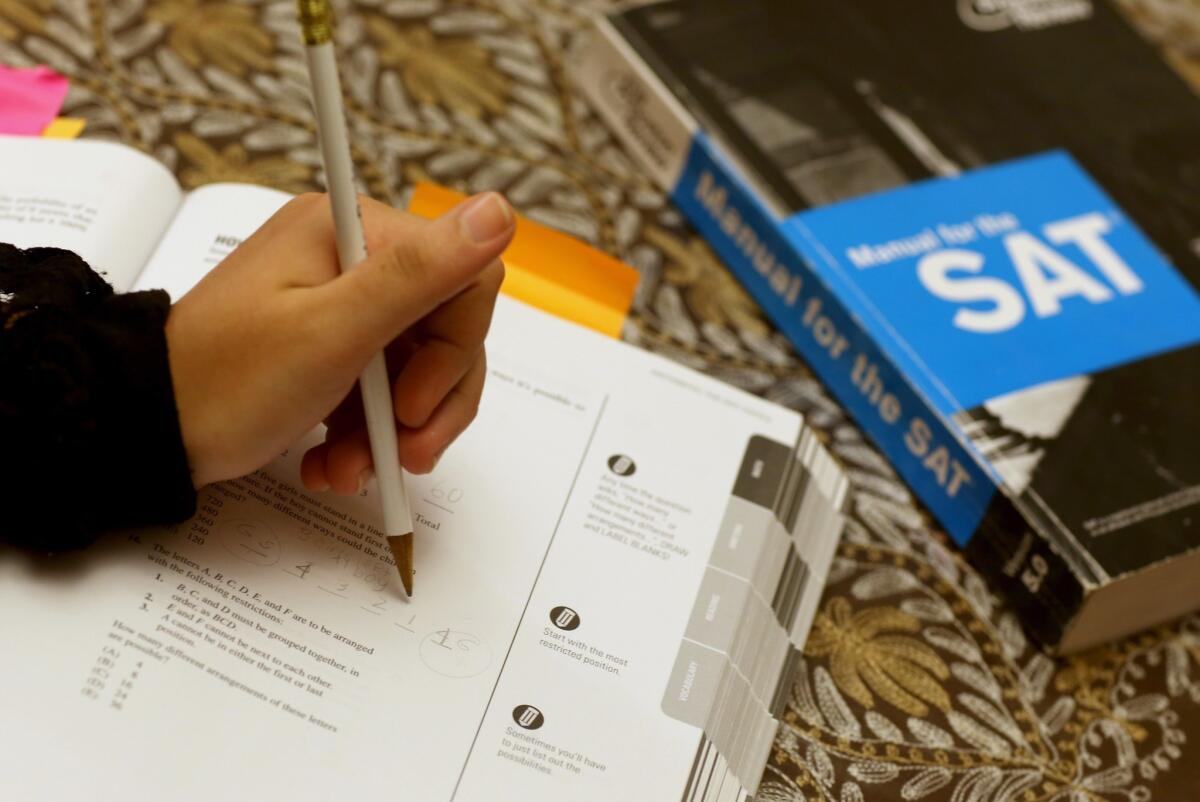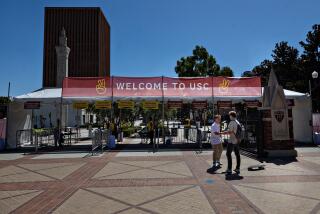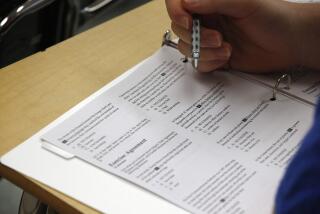SAT’s about-face on essay presents colleges with a tough question

The College Board’s decision to make the essay portion of its influential SAT exam optional is setting off a national debate among colleges and universities about whether to require applicants to take it.
Beyond the potential effect on students, the March 5 announcement about the upcoming test change is stirring soul-searching about the importance of writing in higher education and how best to evaluate that ability. The new College Board policy also has raised concerns about setting up a possible barrier to college entrance, especially if the separate essay writing exam requires an additional fee.
Many colleges will face a serious problem in considering whether to keep mandating the essay test after the change goes into effect in 2016, said Jerome Lucido, executive director of the USC Center for Enrollment Research, Policy, and Practice, a national think tank on college admissions issues. “It certainly presents a decision point,” he said.
The handwritten, 25-minute essay was added as an integral part to the SAT test nine years ago. The College Board now wants to make it a supplemental option in a wider overhaul of the exam it owns. Last year about 1.7 million students took the SAT.
Some colleges don’t consider essay scores and some in recent years have declared the entire SAT and its rival ACT exam as optional for applicants.
But others, particularly such highly competitive schools as Stanford and UCLA, value the essay for providing extra insight into students’ abilities as well as a cross-check on the veracity of other application materials, Lucido and other experts said.
In addition to the SAT essay, which often prompts writers to explore a sociological or philosophical question, many schools require autobiographical compositions in the online Common Application (“Recount an incident or time when you experienced failure. How did it affect you?”). In addition, some campuses require supplemental essays that attempt to learn whether the student would be a good fit for that particular school.
Questions may be raised about assistance from parents or paid coaches if students submit an elegant autobiographical statement with their applications but score poorly on the proctored SAT essay, they said. Unknown to many students, colleges not only receive scores but also can examine the actual essays.
The University of California system had been among the most powerful forces in getting the College Board to add the writing portion to the main test in 2005. Now UC will analyze how useful an optional SAT essay will be in choosing freshmen and whether any additional test costs could discourage students from applying even if they qualify for fee waivers, said George C. Johnson, chairman of the UC system faculty committee that sets admissions standards.
“Whether or not exams are required of students is always a big decision,” said Johnson, a UC Berkeley mechanical engineering professor. “It’s certainly going to be a topic we will discuss carefully.”
California’s other public university system, the 23-campus Cal State, has never looked at scores from the SAT’s writing portion, which includes the essay and multiple choice questions on grammar and usage. Cal State relies on high school grades and the other two SAT sections, reading and math.
Making the essay optional is part of an effort to align the SAT more with what students learn in high school and to discourage expensive private tutoring. But opinions about having standardized exam essays at all are divided in academia.
Boston College now does not consider SAT essay scores and is leaning against requiring the SAT essay when it becomes supplemental, said John L. Mahoney, undergraduate admissions director.
“The notion of anyone being able to produce a meaningful piece of writing in 25 minutes in such a pressurized setting is not reasonable,” he said, adding that good writing “is a process which involves thinking, outlining, drafting, and revising before a finished product is submitted.”
Caltech, on the other hand, values the essay scores from the SAT and the ACT and sometimes retrieves and reads the actual essays, said Jarrid J. Whitney, executive director of admissions and financial aid. So while it is too soon to say whether the Pasadena school will require the SAT essay in two years, Whitney said, “Our students have to be extraordinarily talented in math and science, but they also have to be able to communicate effectively.”
The SAT essay will lose popularity if the ACT’s experience is followed. The ACT added an essay in 2005 too, but it is an optional extra that can be taken on the same days as the main test. Only 52% of the 1.8 million high school seniors last year who took the main ACT also tackled the essay, ACT officials said.
Perhaps more telling, just 11% of four-year colleges and universities in the U.S. — including UC — require the essay if applicants submit ACT scores and an additional 18% recommend it.
The ACT essay costs $16 in addition to the $36.50 for the rest of the test because of the expenses in hiring teachers and others to read essays, officials said. The College Board says it has not yet decided the fees for its new SAT but pledged that the cost, including any supplement for the essay, won’t top the current $51.
Starting next year, Bucknell University in Pennsylvania will stop requiring the ACT essay.
“We haven’t found any data suggesting that it’s helping us make a better decision,” admissions dean Robert Springall said. Other ACT sections on grammar and usage, students’ high school grades in English and teacher recommendations can be more helpful than a single timed test, he said.
Bucknell is leaning against requiring the SAT essay when it is separated from the main test. Additionally, Springall fears that getting students to register and pay for the supplemental essay “adds time and complications to a process that is already time-consuming and complicated enough.”
Yet USC has found that the SAT essay bolsters the overall test’s ability, along with high school grades, to predict freshman success, said admissions dean Timothy Brunold. He said he wants to closely study how well the new exam without the essay could do that before deciding whether to require applicants take the supplemental essay in 2016 and after.
USC sometimes finds suspicious gaps in writing skills when comparing personal statements to the test essays. The exam “allows us to observe the students’ writing in a controlled format,” he said.
Among other changes, the new SAT, like the ACT, will count only correct answers, no longer reducing scores for wrong guesses. The SAT’s main test will return to two parts — math and one for reading and writing — as it had been for generations before 2005. A perfect score will again be 1600, not the current 2400.
The essay will be scored separately on a scale that has yet to be determined. The essay will change too, demanding more analysis and citations from the question and discouraging personal statements that can be prepared in advance, according to the College Board.
Several critics have suggested that making the essay optional sends an unwanted message to students that writing well is not that important. College Board President David Coleman last week denied that implication, saying writing abilities still will be tested in the multiple choice sections and that the reformed essay itself will be a better measurement of how students build arguments based on facts, not opinions.
Whatever colleges decide about the test, said Lucido of the USC-based enrollment research center, “It won’t make writing less important as a college skill nor will it make writing less important in the college curriculum.”
More to Read
Sign up for Essential California
The most important California stories and recommendations in your inbox every morning.
You may occasionally receive promotional content from the Los Angeles Times.










